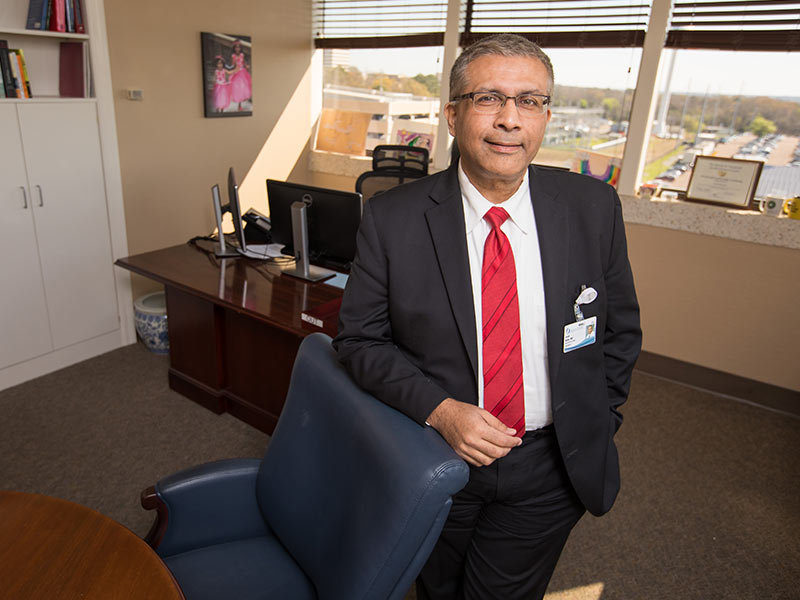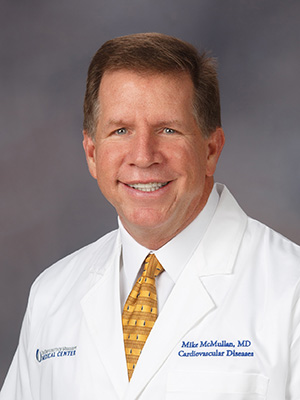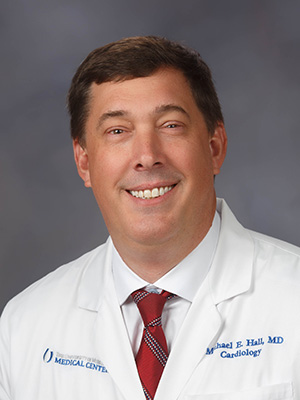Medicine gains ‘Grade A mentor, human being’ as new department chair

Dr. Javed Butler can describe the exact moment when he began the switch to hearts from livers.
“I had wanted to be a hepatologist,” said Butler, who recently joined the University of Mississippi Medical Center as the Patrick Lehan Chair of Cardiovascular Research and chair of the Department of Medicine, “but, in my second year of residency, I was sitting in an auditorium for Grand Rounds, listening to Dr. Milton Packer.
“When I heard him,” Butler said, referring to the iconic cardiology researcher, “I was in awe. That lecture changed the entire direction of my career.”
Those who know Butler say it was not Packer’s fault, but instead his virtue – one that has benefited cardiology research and treatment.
“Dr. Butler is easily the smartest person, or among the smartest, in the room pretty much on any topic having to do with cardiology care,” said Dr. Hal Skopicki, who recently succeeded Butler as division chief of cardiology at the Stony Brook (New York) School of Medicine.
“And he’s among the kindest and most compassionate people I’ve ever met. In his new role with [UMMC], I believe it’s going to be a wonderful marriage.”
Butler tied the knot with the Department of Medicine, he said, because it “stood out as one that had incredible opportunities and assets to the max.”
He arrived at the Medical Center in January from Stony Brook, where he had been since 2014 and where he had also served professor of medicine, professor of physiology and biophysics, and co-director of the Heart Institute.
“Most places don’t have what we have here at UMMC,” he said.

Here, the heart failure expert is the holder of a research chair named for the late physician known for training most of the state’s cardiologists. Dr. Patrick Lehan, who died in 2002, was “my mentor and hero,” said Dr. Michael McMullan, professor of medicine in cardiology, chief of the Division of Cardiovascular Diseases and director of the Adult Congenital Heart Program at UMMC.
“Dr. Butler is an excellent recipient of the Lehan Chair. It’s been great to get to know him.”
Dr. Michael Hall, UMMC associate professor of medicine in cardiology, knows Butler through their mutual work with the American Heart Association.

“He has what it takes to help us excel at research, education and patient care,” Hall said. “He has vision for the department and a strong record. He has been at some of the finest institutions in the country.”
One of those institutions is Yale University, where, during his residency, Butler experienced his epiphany that eventually led him, some two decades later, to the Medical Center as successor to Dr. Dan Jones, who had served as interim chair of medicine since the death of Dr. William C. Little in 2015.
Because of that move, Mississippi will add another geriatrician to its physician ranks: Dr. Asma Butler, Butler’s wife.
“Within a few years, she will take care of me,” said Javed Butler, “if I’m good to her.”
The couple has two daughters; Sophia, 10; and Zara 6; they have lived all of their lives in the United States, where their father has resided since 1991.
Born in Pakistan, Butler grew up there with two siblings: a sister who is also a physician, and a brother, who died years ago at age 14 after a life of medical challenges related to complications of encephalitis.
“Both my parents were 100 percent committed to my brother and there was never even remotely a discussion that he was different from the other two children,” Butler said. “My mother gave up her career to take care of his every single need.
“From my father, I learned the importance of giving back, especially from his work with an orphanage.”
With such an upbringing, Butler said, “it just gets ingrained into you that life is more than you and your existence.”
It is also more than a good education – but not much more. “We could get by with a lot from my parents,” Butler said, “but not getting good grades wasn’t one of them. They never chewed their words about that, especially my father.
“I believe I have his hard-working gene covered and he would be proud of me for that. Where I fall short of my dad by a big margin is his pro bono work for people in need; he was a lawyer, like my grandfather and my uncle.”
Butler had considered a legal career. “But my mother put the kibosh on that,” he said. “There were enough lawyers in the family. The law still attracts me, though; I don’t believe anyone has a better opportunity than a lawyer to bring about societal change.”
In fact, one day he may take a shot at a juris doctorate, he said. “If my wife reads this, she will freak out: ‘There’s no way he’s doing more school.’”
Degree-wise, Butler has already cut a swath through the alphabet. At Harvard, he earned a Master of Public Health. At Emory University, where he directed the Heart Failure Research Program, he received his M.B.A.
His degrees in medicine and surgery are from Aga Khan University in Karachi, Pakistan, and he finished his residency in internal medicine in primary care at Yale University. In Boston, at Massachusetts General Hospital, he did cardiac imaging training.
Much of the work he is known for grew out of his stay at Vanderbilt, where he was medical director of the Heart Transplant and Heart-Lung Transplant programs. There in Nashville he completed two fellowships: one in cardiovascular disease and another in advanced training in heart failure and transplant.
All of that, as he said, was Milton Packer’s doing at Yale. Not only did Butler attend Packer’s presentation on the evolution of our understanding of heart failure and where the science was going, he also took “a ton of notes” later on at Packer’s lecture at a meeting of the American Heart Association, which Butler would serve for eight years as deputy chief science officer.
“There wasn’t even a heart failure subspecialty at the time,” Butler said. “But I listened as Dr. Packer outlined the way he thought things would play out over the next 20 years or so. The fact that a second-year resident who had not been interested in cardiology could understand and, importantly, ‘feel’ what he was saying – that was phenomenal.
“My recollection says about 80 percent of what he said has come true. A vast majority of it, he made come true. He unfolded the cardiology world in that direction.”
Today, Butler is well-known in that world, Skopicki said. “Whenever we attend a heart failure lecture together, the presenter usually shows several slides with Dr. Butler’s name on them.
“Fancying myself an accomplished heart failure expert, I would turn to him with any vexing or troubling case. That’s incredibly rare in a world where such an accomplished member is also a Grade A mentor, educator and human being who wants to figure out what he can do to help you.”
Butler is also figuring out what he can do to help his field. He sees the day when cardiology and cardiology surgery will merge into one specialty. And he believes that advances in imaging will make it easier to target specific stages of a disease, making treatment more effective.
As for the future of the department he now leads, he said, “there is opportunity for improvement, even if you’re No. 1. My education team is very strong. In the clinic, we provide pretty much anything you can find anywhere else in the country.
“Research is an area where I believe we can make a difference. Great research is being done at the Medical Center, but the Department of Medicine can increase its research portfolio more, and there’s no reason it shouldn’t be much more than it is.
“The question for me now is: Where can you make a real change?’ UMMC gives me the best opportunity, and I am very grateful for that.”

